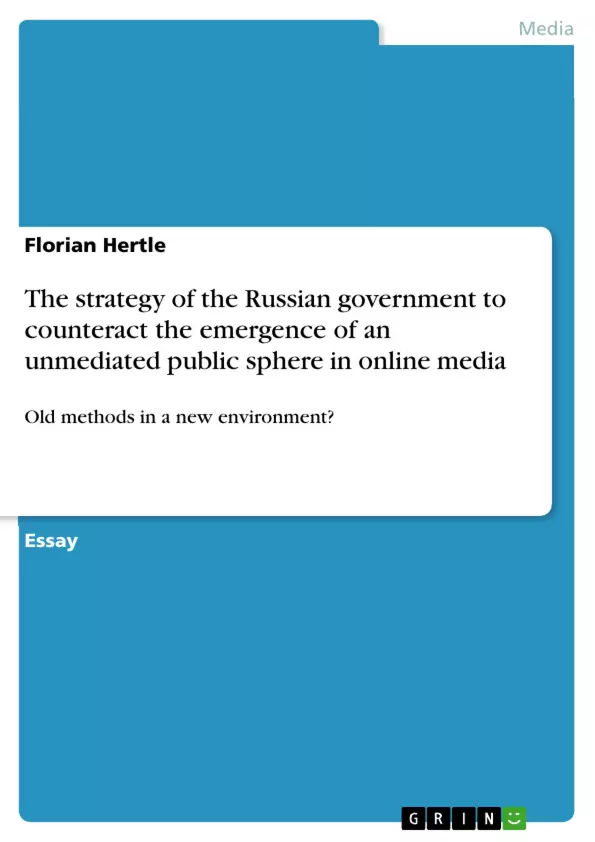This paper wants to ascertain if the Russian government’s strategy to regulate internet media uses totally new methods or if the tools used to control online content are often indistinguishable from the ones used in traditional media. To answer this question first it will be worked out a theoretical framework, based on which this research can be conducted. Next will be an overview about the development and usage statistics of the Russian internet, before the legal and non-legal strategy concerning the internet media regulation in Russia, as well as related phenomena will be elaborated. The paper ends with a conclusion and an outlook on possible further development and necessary research.
One important tool of the current Russian elites under the leadership of President Putin to secure power is controlling the media, as it helped them maintain Putin’s popularity despite several economic crisis and sanctions.
Having secured control over traditional media, Russia’s ruling regime however entered a battle with content shared on social media and internet media outlets "to consolidate an information dominance over citizens", as the online sphere brings several new threats for the Russian government, including counter narratives to official propaganda and the coordination of oppositional forces.
Inhaltsverzeichnis (Table of Contents)
- Introduction
- Theoretical Framework
- Characteristics of the Russian internet media sphere
- Development of the Russian internet media and its influence
- Usage statistics concerning the Russian internet media
- Legal strategy to regulate internet media
- Non-legal strategy to regulate internet media
- Framing
- Cultural values and ideology
- Manipulated public scene and agenda setting
- Publication hurdles
- Collaboration with internet companies
- Regulation of phenomena influencing internet media
- Social media and bloggers
- General internet regulation
- Conclusion
Zielsetzung und Themenschwerpunkte (Objectives and Key Themes)
This paper aims to determine whether the Russian government's strategy to regulate internet media utilizes entirely new methods or, as Ognyanova argues, employs tools indistinguishable from those used in traditional media. To address this question, the paper will first establish a theoretical framework, followed by an analysis of the development and usage statistics of the Russian internet, the legal and non-legal strategies for regulating internet media in Russia, and related phenomena. The paper concludes with an outlook on potential further development and necessary research.
- Regulation of internet media in Russia
- Influence of network society on internet media regulation
- Disintegration of the public sphere in the context of internet media
- Strategies of the Russian government to control internet media
- Impact of internet media on Russian society and politics
Zusammenfassung der Kapitel (Chapter Summaries)
The introduction discusses the Russian government's efforts to control media, particularly internet media, and the challenges posed by counter narratives and oppositional forces. It outlines the paper's objective and methodology, focusing on analyzing the theoretical framework, the development of Russian internet media, and the legal and non-legal strategies employed for its regulation.
The theoretical framework chapter introduces the concept of the network society, as defined by Manuel Castells, and explores its implications for the regulation of internet media in Russia. It also delves into Jürgen Habermas' theory of the disintegration of the public sphere and its relevance to the Russian context.
The chapter on characteristics of the Russian internet media sphere presents an overview of its development, influence on news consumption, and key features. It examines the emergence of the internet in Russia, the role of Roskomnadzor, and the evolution of internet media through various phases, highlighting its impact on the Russian media landscape.
The chapter on the legal strategy to regulate internet media discusses the Russian government's efforts to control online content through legislation and regulatory measures. It explores the legal framework governing internet media in Russia and the challenges posed by the rapid development of the online sphere.
Schlüsselwörter (Keywords)
The key terms and focus topics of this work include: Russian internet media, regulation, network society, public sphere, government control, propaganda, counter narratives, social media, legal and non-legal strategies, and online content.
Frequently Asked Questions
How does the Russian government regulate internet media?
The government uses a mix of legal strategies, such as restrictive legislation, and non-legal strategies like framing, agenda setting, and collaboration with internet companies.
What is the role of Roskomnadzor in Russia?
Roskomnadzor is the federal executive body responsible for supervising and censoring media, including the regulation of online content and internet outlets.
Does the Russian government use the same tools for online and traditional media?
The paper investigates if the tools used to control online content are indistinguishable from those used in traditional media to maintain information dominance.
What threats does the internet pose to the Russian ruling regime?
The online sphere allows for counter-narratives to official propaganda and provides a platform for the coordination of oppositional forces.
How are bloggers and social media regulated in Russia?
They are subject to specific legal hurdles and monitoring intended to prevent the emergence of an unmediated public sphere.
What theoretical frameworks are used in this study?
The study utilizes Manuel Castells' concept of the network society and Jürgen Habermas' theory on the disintegration of the public sphere.
- Citar trabajo
- Florian Hertle (Autor), 2020, The strategy of the Russian government to counteract the emergence of an unmediated public sphere in online media, Múnich, GRIN Verlag, https://www.grin.com/document/909676



